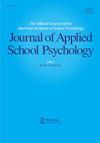行为干预的二级适应特刊简介:聚焦创新和建议
IF 1.5
Q4 PSYCHOLOGY, EDUCATIONAL
引用次数: 1
摘要
鉴于多层次干预措施的快速增长和扩展,以及对行为的支持,教育工作者和研究人员越来越多地寻求支持和创新,以实施更高级的干预措施。虽然仍需要开展与实施普遍或第一级干预措施和规划相关的工作,但在更具体的第二级行为干预措施方面存在相当大的差距。一些研究已经记录了二级行为干预对学生成绩的显著影响(例如,签到/退房;Drevon, Hixson, Wyse, & Rigney, 2019),然而,通过使这些干预措施适应学生的需求和提供这些干预措施的环境,来提高这些干预措施的有效性和效率的方法的研究和指导有限。因此,本期特刊包含了一组专注于第二级行为干预的原创论文,这些论文超越了典型的“一刀切”的行为问题第二级干预方法,并以6年前出版的《应用学校心理学杂志》(Stormont & Reinke, 2013)上一期关于第二级当前问题的特刊为基础。具体来说,这期特刊提供了概念和基于研究的论文,描述了适应第2级行为干预的方法。在Stormont和Reinke(2013)之前关于这一主题的工作的基础上,我们组织了一个特别问题,其总体目标是推进与适应第2层干预和第2层中的适应过程相关的经验和理论工作。具体来说,这组概念性和研究性的论文描述了几种实际可行的方法来调整第二级行为干预措施,以满足需要第二级干预的学生的不同需求,从而提高有效性,并可能减少对第三级支持的过度识别。为此,我们借鉴了多个领域的应用研究,包括通识教育、特殊教育、心理学、咨询、本文章由计算机程序翻译,如有差异,请以英文原文为准。
Introduction to Special Issue on Tier 2 Adaptations to Behavioral Interventions: A Focus on Innovations and Recommendations
Given the rapid growth and expansion of multi-tiered interventions and supports to address behavior, educators and researchers are increasingly seeking support and innovations regarding the implementation of interventions at the more advanced tiers. While there is still a need for work related to implementation of universal or Tier 1 interventions and programs, there has been a considerable gap in relation to Tier 2 behavioral interventions more specifically. Several studies have documented significant outcomes of Tier 2 behavioral interventions on student outcomes (e.g., Check-in/Checkout; Drevon, Hixson, Wyse, & Rigney, 2019), yet there is limited research and guidance around methods for improving the effectiveness and efficiency of these interventions by adapting them to students’ needs and the contexts in which they are delivered. As a result, this special issue includes a set of original papers focused on Tier 2 behavioral interventions that move beyond typical “one size fits all” approaches to Tier 2 interventions for behavior problems and builds on a previous special issue on current issues in Tier 2 in the Journal of Applied School Psychology (Stormont & Reinke, 2013) published 6 years ago. Specifically, this special issue provides conceptual and research-based papers that describe approaches to adapting Tier 2 behavioral interventions. Building on the prior work on this topic by Stormont and Reinke (2013), we organized a special issue with the overarching goal of advancing empirical and theoretical work related to adapting Tier 2 interventions and adaptive processes within Tier 2. Specifically, this set of conceptual and research-based papers describe several practical, feasible approaches to adapting Tier 2 behavioral interventions to meet the varying needs of students requiring Tier 2 intervention, thus improving effectiveness and potentially reducing overidentification for Tier 3 supports. Toward this end, we drew upon applied research across multiple fields, including general education, special education, psychology, counseling,
求助全文
通过发布文献求助,成功后即可免费获取论文全文。
去求助
来源期刊

Journal of Applied School Psychology
PSYCHOLOGY, EDUCATIONAL-
CiteScore
2.40
自引率
10.00%
发文量
7
期刊介绍:
With a new publisher (Taylor & Francis) and a new editor (David L. Wodrich), the Journal of Applied School Psychology will continue to publish articles and periodic thematic issues in 2009. Each submission should rest on either solid theoretical or empirical support and provide information that can be used in applied school settings, related educational systems, or community locations in which practitioners work. Manuscripts appropriate for publication in the journal will reflect psychological applications that pertain to individual students, groups of students, teachers, parents, and administrators. The journal also seeks, over time, novel and creative ways in which to disseminate information about practically sound and empirically supported school psychology practice.
 求助内容:
求助内容: 应助结果提醒方式:
应助结果提醒方式:


